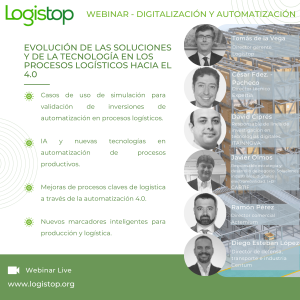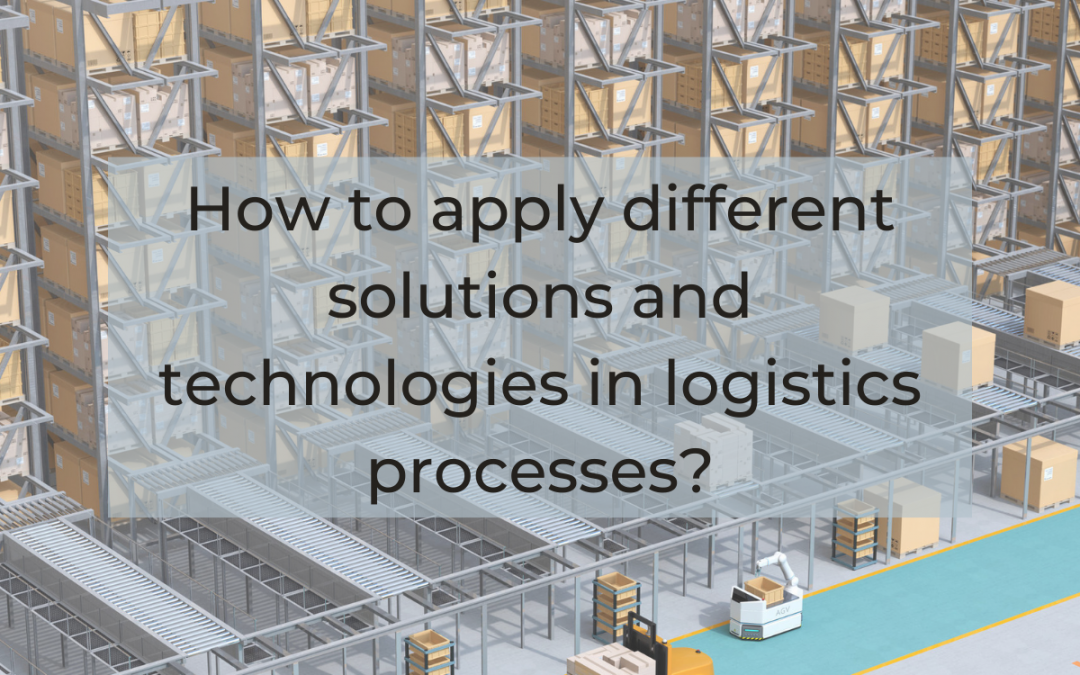-
Knowledge of available technologies will enable companies to approach change from a strategic position.
- Virtual simulation will allow a better understanding of the process and be prepared for the change to take place.
- Obtaining a process to improve and provide advanced decision-making techniques is the great paradigm of artificial intelligence.
- Optimisation and maintenance are two key aspects to take into account when improving logistics processes.
In the Logistop Webinar “Evolution of solutions and technology in logistics processes towards 4.0” we take a look at some of the latest automation technologies and analyse some reference examples.
For this, we have counted with the participation of the leaders of the Logistop Digitalisation and Automation working group César Fernández – Pacheco, Technical Director, Expertia, David Ciprés, Head of Research Line in Digital Technologies, ITAINNOVA, y Javier Olmos, Head of Strategy and Business Development, Industrial, Digital and Electromobility solutions, R&D, CARTIF, as well as Ramón Pérez, Sales Director, Actemium, and Diego Esteban López, Defence, Transport and Industry Director, Centum, and with the presentation of Tomás de la Vega, Managing Director, Logistop.

Evolution to logistics 5.0
Today, the situation in which logistics finds itself in the technological sphere stands out for its great complexity due to the rapid maturing of the different technologies. As César Fernández – Pacheco points out, there is currently a lot of entropy of solutions, but also a lot of innovation and change, which means that there is a concern that must be addressed by knowing the technologies well from a strategic position.
“The logistics sector is facing a highly complex framework due to the rapid maturation process that the different technologies available to us have undergone”
César Fernández – Pacheco, Technical Director, Expertia
Simulation for validation of automation investments in logistics processes
David Ciprés then showed, through four examples of use cases, how simulation makes it possible to represent and analyse automated systems in logistics processes accurately and in advance, helping to better understand the process and improve receptiveness to change. He emphasised that this virtual technology makes it possible to know the future before it happens and thus be prepared for the change that will be produced.
“Virtual simulation makes it possible to: 1) represent and analyse processes accurately and in advance; 2) help to better understand the process; 3) show a more receptive character to change; 3) identify restrictions and detect where bottlenecks are located; 4) and, finally, help to reduce costs”
David Ciprés, Head of Research Line in Digital Technologies, ITAINNOVA
AI and new technologies in production process automation
For his part, Javier Olmos provided his vision of how, from the point of view of artificial intelligence, control processes are being revolutionised. The great paradigm to be faced is how to involve artificial intelligence in order to make the most of all the information available and, from this, to obtain a process that allows for improvement and provides advanced techniques for decision making. To do this, a controlled environment must be available, generated with efficient rules and with a clear idea of how to unite the industrial and research sides in order to achieve better results.
“Sensing and perception, knowledge and learning, reasoning and decision making, actions and interactions, systems, methodologies, hardware and tools are the main cross-cutting technology enablers of AI, data and robotics that we need to consider and apply in our logistics processes.”
Javier Olmos, Head of Strategy and Business Development, Industrial, Digital and Electromobility solutions, R&D, CARTIF
Improving key logistics processes through Industry 4.0
Ramón Pérez stressed the importance of aligning the maintenance objectives of logistics processes with production objectives, thus avoiding the need to make changes to the established maintenance strategy. In this sense, he emphasised the need to consider maintenance as an investment and not as a cost, as it allows the company’s profitability and profit and loss account to be improved.
In this sense, he emphasised that maintenance is a process that must be automated with the tools provided by Industry 4.0, with the digitalisation of maintenance activity, the optimisation of predictive and corrective maintenance, as well as the optimisation of training through virtual reality, being the main areas in which to apply the technologies we have at our disposal.
“Automation 4.0 applied to maintenance aims to reduce maintenance costs and optimise the tasks to be performed. This will lead to a reduction in production costs, optimise productivity and make customers more competitive”
Ramón Pérez, Sales Director, Actemium
Process optimisation through artificial intelligence
Finally, Diego Esteban López believes that there are many technologies and possible solutions to the same (or similar) problems, but there is no clear solution that stands out from the rest. In this sense, he expects that in the coming years one of these technologies will be defined and focused on, and that it will become the main technology.
In addition, as Diego pointed out, it is important to bear in mind the fundamental role played by optimisation in converting data into information, as there are many cases of use in which it is necessary to go to the source due to the insufficiency of existing data. He also believes that greater sensorisation is needed in industry and logistics to provide a substantial volume of data in order to be able to apply artificial intelligence.
“The main challenges being experienced by RTLS systems are: 1) to be as unobtrusive as possible; 2) to be easily integrated with existing systems; 3) to require minimal additional installation; 4) to require as little maintenance as possible; 5) to have as much autonomy as possible; and 6) to improve the accuracy of indoor geolocation.”
Diego Esteban López, Defence, Transport and Industry Director, Centum
About Logistop
Logistop is the benchmark workspace for collective innovation through the realisation of projects hand in hand with our members. Transforming the entire supply chain into a more efficient and sustainable one. All this with the aim of articulating and carrying out innovation projects among the members, without excluding the possibility of collaborating with or receiving support from certain organisations outside Logistop.

